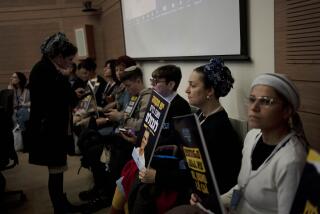In Theater of Talks, Dignified Exits Urged
- Share via
LONDON — Terry Waite, who is working to secure the release of Westerners kidnaped in Lebanon, said in an interview broadcast Sunday that hostage negotiations are like a theater performance and that there must be a dignified exit for both sides.
The Anglican Church envoy discussed the difficulties of hostage negotiations on the British Broadcasting Corp.’s “World This Weekend” radio program. It was recorded just before Waite left last Thursday for Lebanon on his latest round of shuttle negotiations.
It was not clear what role his efforts had in the release there Sunday of American hostage David P. Jacobsen, of Huntington Beach, Calif., who was held for 17 months by the underground Shia Muslim group Islamic Jihad (Islamic Holy War). Five Americans and 13 other foreigners remain captive in Lebanon.
Waite, a special envoy for Archbishop of Canterbury Robert A. K. Runcie, said the first critical element to successful negotiations is finding “the principal actor” who holds the key to unlocking the kidnap situation.
“You enter the stage with that actor and slowly but surely together you begin to put up pieces of scenery,” he said.
“As you put up each piece, you agree on it . . . and when the set’s complete, you’re careful to build into that set an exit through which at the end of the performance you both walk with dignity.
“If you can do that, and you’re lucky if you can do that, then I think that would describe a reasonably successful negotiation process,” he said.
Waite said many pitfalls exist.
“One has to work in a situation where it’s very, very difficult indeed to establish a relationship of personal trust between oneself and kidnapers. And I think that’s very important to be able to establish that,” he said.
“Secondly, it makes it very difficult when clearly, you’ve got people engaged in the kidnaping business who . . . simply take people to sell them for personal gain and profit,” he said, adding that this practice was “not unknown” in Lebanon.
“I am not prepared at any point to pay any ransom or to give way to demands of that kind which would totally compromise my position and totally compromise the position of other people,” he said.
The son of a policeman from northwestern England, Waite, 47, served in the British army before developing an affinity for Third World church work. He helped organize food relief programs in Sudan and then advised the Roman Catholic Church on international developments and missionary activities.
In 1980, he went to work for the Anglican Church. Waite’s role as a hostage negotiator developed purely by chance. In 1981, after months of futile efforts through official channels to free three Anglican missionaries being held by the Iranian government, Waite suggested he try himself, noting, “After all, they are our own people.”
Waite, whose patient, passive nature seems a contradiction to his 6-foot 7-inch, 230-pound frame, eventually won their release.
Waite took up his efforts at freeing the American hostages last year after Runcie received a letter purportedly signed by four of the hostages, asking for help.
Waite said kidnapers are willing to deal with him instead of governments because he comes “from a religious base, and not from a political base.”
“I do not have a political ax to grind. So I have all the vulnerability, if you like, of being a person who has a very large measure of freedom to understand and to try and work a way through situations,” he said.
“But because of that it doesn’t mean to say that I shall succeed in every situation. Some I will and some I shall fail but at least I do my best.”
In August, Waite, who is married and has four children, said he was considering giving up his job because of the dangers and pressures involved. A friend, speaking to reporters on condition of anonymity, said Waite was seriously considering two job offers when he was asked to undertake his present mission in Beirut.
“I will not do this for the rest of my life as I have already said,” Waite said in the BBC interview. “You have to know when the time comes to withdraw gracefully and recognize that it’s time for somebody else to take up the lead that perhaps I have given.
“I have no motives other than that I’ll do what I can, when I can, whilst I can. When the time comes to leave it, I’ll leave it.”
More to Read
Sign up for Essential California
The most important California stories and recommendations in your inbox every morning.
You may occasionally receive promotional content from the Los Angeles Times.













